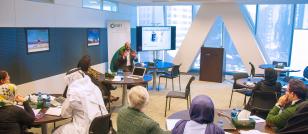General
-

About HBKU
Discover what makes HBKU an innovation-based entrepreneurial university.
-

HBKU Leadership
Meet the leadership making HBKU a transformative place to study and work.
-

People
Read about the people who create a unique environment for learning and research.
-

Career Opportunities
Join an innovative organization and the people who are shaping tomorrow.
Admissions
Join a student body shaping tomorrow by enrolling in one of our innovative degree programs.
EXPLORE OUR PROGRAMSOverview

Our students, faculty, and scholars actively engage in innovative solutions to the world’s problems within multi-disciplinary programs.
Life at HBKU
-

Overview
Life at HBKU involves a transformative learning culture that engages students in and out of the classroom, developing innovative entrepreneurs and global citizens within Qatar and beyond.
-

Multaqa (Education City Student Center)
A student-centered and educationally purposeful facility, the Education City Student Center is the “majlis” of Education City and serves as the hub for both formal and informal events and activities.
-

Housing at Education City
With housing that is accessible, sustainable, and affordable, there are plenty of reasons to consider living in Education City.
Upcoming Events
-
01 Oct
Qatar International Cybersecurity Contes...
All Day 08:00 AM-08:00 AM, Minaretein (College of Islamic Studies building), Education City
-
01 Oct
Contest start date
All Day 04:45 PM-04:45 PM

Center for Islamic Economics and Finance
Back to Research Page
Overview
In the contemporary world, the principles, premises, and institutions of Islamic economics are increasingly becoming relevant for the formulation of policies and management of economies and businesses. Islamic finance is one of the fastest growing areas of international finance.
New products are continuously emerging, and those wishing to participate in this exciting and dynamic field have to be knowledgeable about both the principles of Islamic economics and finance and contemporary developments in the international financial industry. A particularly high concentration of Islamic financial institutions in the Middle East calls for localized research that offers the industry concrete analysis, new ideas, and contextual maps of past, present, and future events.
Legal, regulatory, and market environments are rapidly changing., and under such dynamic conditions, the Center for Islamic Economics and Finance (CIEF) was established in 2010 to provide students, faculty, and visiting scholars a resource rich environment to help put them on the cutting edge of contributions in their field. In 2014, Dr. S. Nazim Ali, former director of Harvard’s Islamic Finance Project, took over as the Center’s director. Today, he is guiding CIEF towards its vision of contributing to an ethically grounded global economy.
Vision
The CIEF sees itself as a global center of excellence in the scientific discipline of Islamic economics and finance, promoting economic justice and prosperity through the development of genuine financial products, monetary and fiscal policies, and business and trade practices. The Center envisions its research as providing contextual maps for ethically grounded economies.
Mission
CIEF’s mission is to produce policy-relevant basic and applied research with concrete analysis of national, regional, and international developments in Islamic economics and finance that can expand the body of knowledge about genuine financial products, economic development, and financial inclusiveness and sustainability. To these ends, the CIEF individually and in partnership with other institutions will focus on the following areas:
- Islamic economic institutions, inclusiveness, and empowerment
- Innovative and genuine financial products
- Inclusive and sustainable monetary, fiscal, and financial sector development policies
- Promotion of trade, investment, and business in the Organization of Islamic Cooperation region
Objectives
- Planning and producing impactful research
- Supporting the research needs of the faculty
- Organizing research events, conferences, workshops, seminars, etc.
- Establish research networks locally and internationally
- Develop proposals for external funding of research
- Critically review Islamic financial products, institutions, and markets
- Coordination of research and teaching of Islamic economics and finance for ethically grounded economies
- Resources

